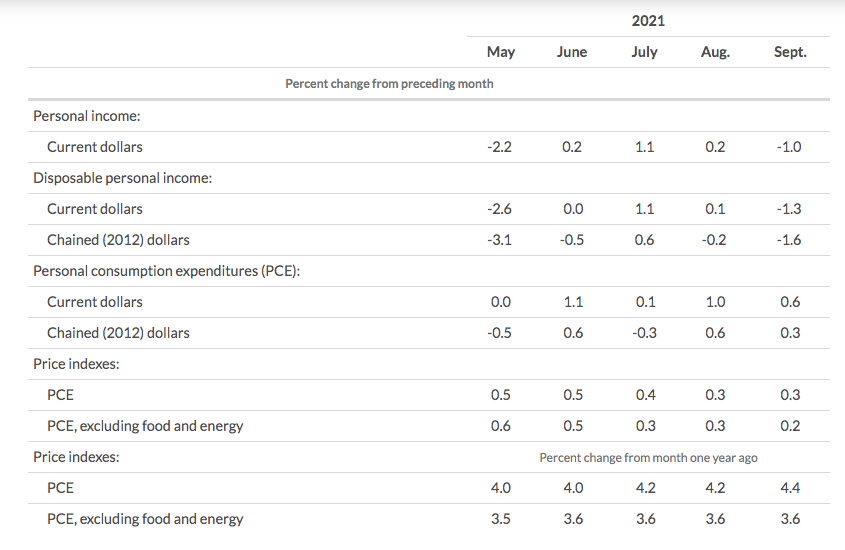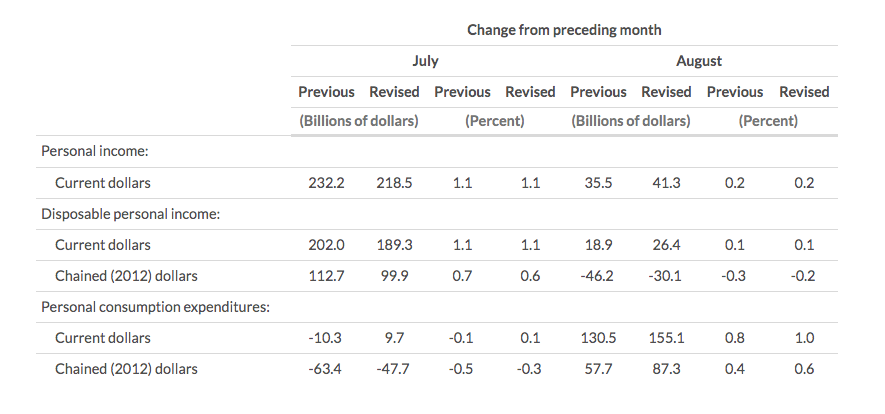The Bureau of Economic Analysis has issued the following press release:
Personal income decreased $216.2 billion (1.0 percent) in September according to estimates released today by the Bureau of Economic Analysis (tables 3 and 5). Disposable personal income (DPI) decreased $236.9 billion (1.3 percent) and personal consumption expenditures (PCE) increased $93.4 billion (0.6 percent).
Real DPI decreased 1.6 percent in September and Real PCE increased 0.3 percent; goods increased 0.1 percent and services increased 0.4 percent (tables 5 and 7). The PCE price index increased 0.3 percent. Excluding food and energy, the PCE price index increased 0.2 percent (table 9).

The decrease in personal income in September primarily reflected a decrease in government social benefits, both in unemployment benefits and “other” benefits (table 3). Unemployment insurance decreased reflecting decreases in payments from the Pandemic Unemployment Compensation program, the Pandemic Emergency Unemployment Compensation program, and the Pandemic Unemployment Assistance program. “Other” social benefits decreased primarily reflecting decreases in the Provider Relief Fund, economic impact payments, and Paycheck Protection Program loans to nonprofit institutions.
The $93.4 billion increase in current dollar PCE in September reflected an increase of $63.6 billion in spending for services and a $29.9 billion increase in spending for goods (table 3). Within services, the largest contributors to the increase were spending for health care as well as food services and accommodations. Within goods, an increase in spending for nondurable goods was partly offset by a decrease in durable goods. The increase in nondurable goods primarily reflected increases in food and beverages, “other” nondurable goods (led by pharmaceutical products), and gasoline and other energy goods. The decrease in durable goods primarily reflected a decrease in motor vehicles and parts (led by new motor vehicles). Detailed information on monthly PCE spending can be found on Table 2.3.5U.
Personal outlays increased $92.1 billion in September (table 3). Personal saving was $1.34 trillion in September and the personal saving rate—personal saving as a percentage of disposable personal income—was 7.5 percent (table 1).
The PCE price index for September increased 4.4 percent from one year ago, reflecting increases in both goods and services (table 11). Energy prices increased 24.9 percent while food prices increased 4.1 percent. Excluding food and energy, the PCE price index for September increased 3.6 percent from one year ago.
Updates to Personal Income and Outlays
Estimates have been updated for July and August. Revised and previously published changes from the preceding month for current-dollar personal income, and for current-dollar and chained (2012) dollar DPI and PCE, are shown below.

